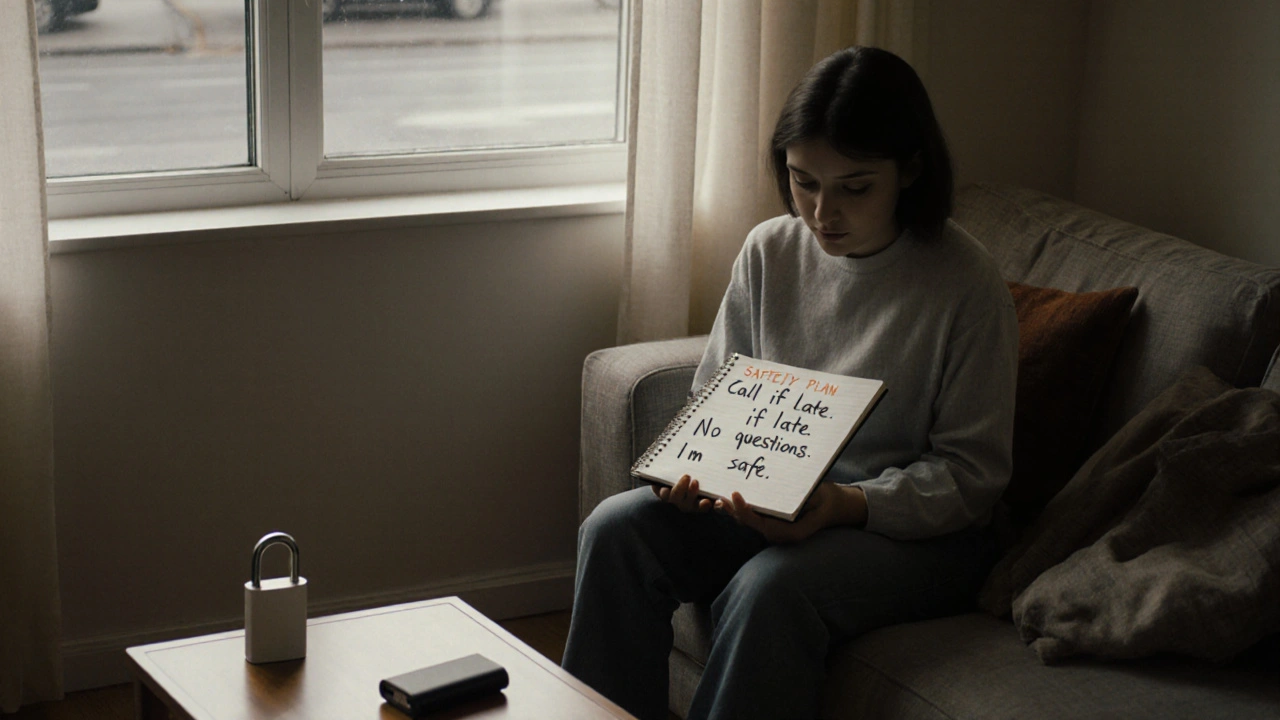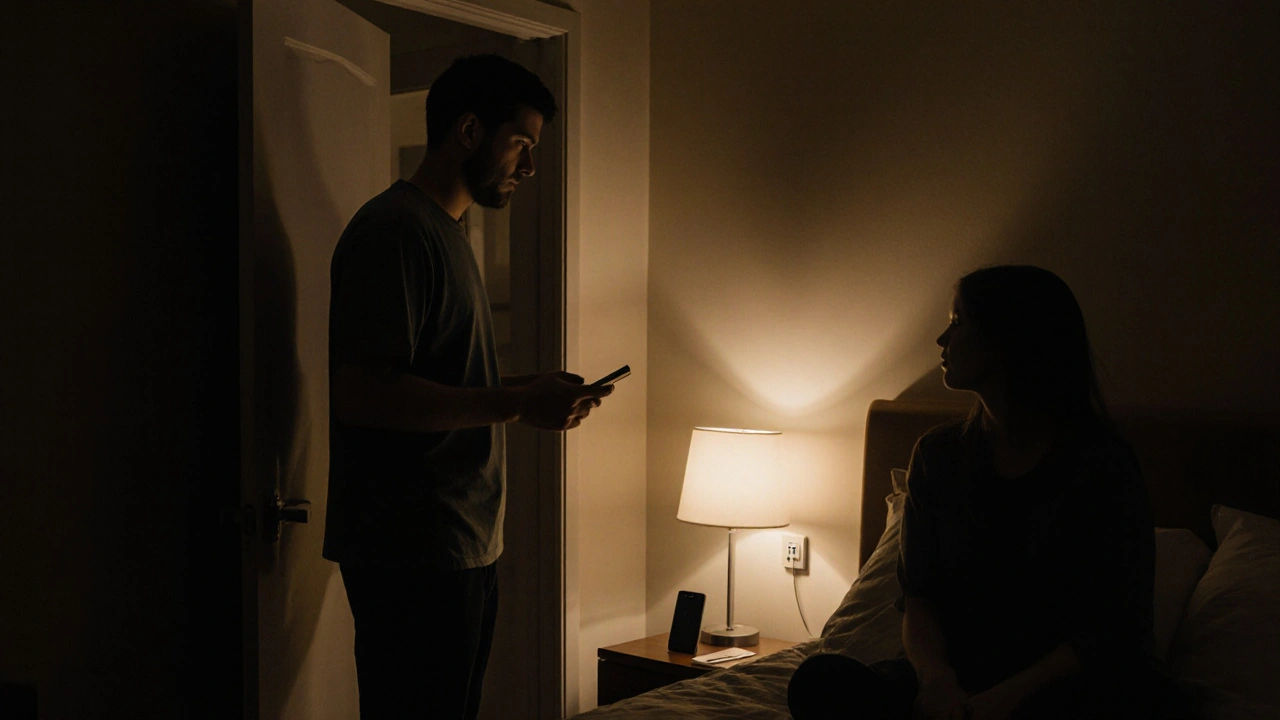When you work in sex work, safety doesn’t start at the door-it starts at home. The conversations you have with your partner, roommate, or even someone you’re dating can make the difference between walking out safely and being left vulnerable. Too many people assume that safety is about screening clients, using apps, or carrying alarms. But what happens when you come back? Who do you talk to? What do you say? And most importantly-do they listen?
Start with the basics: Define your boundaries before you leave the house
You don’t need to give every detail. You don’t owe anyone your schedule, your client names, or your earnings. But you do owe yourself clarity. Before you go out, have a simple, direct talk with your partner. Say something like: "I’m working tonight. I’ll text you when I’m done and when I’m home. If I don’t text by 2 a.m., call me. If I don’t answer, call the police. No questions asked." This isn’t about fear. It’s about control. When you set this kind of structure, you remove the guesswork from your safety net. Your partner doesn’t need to understand your job-they just need to know how to protect you.Use code words. Not just for emergencies
Code words aren’t just for spy movies. They’re practical. A lot of sex workers use them to signal danger without alarming anyone nearby. Pick a word or phrase that means "I need help now," like "The cat’s out," "I need my sweater," or "Is the milk still good?" Make sure your partner knows it means drop everything and act. But don’t stop there. Use code words for good things too. "I’m good" can mean "I’m safe and done." "I’m running late" might mean "I’m stuck with a difficult client and need more time." These phrases reduce stress and let you communicate without sounding anxious or suspicious.Plan your exit strategy-inside the house
Where you live matters. If you share a space, make sure you have a clear way to lock yourself in. A bedroom door with a deadbolt? Good. A door that only latches? Not enough. Install a doorstop alarm or a portable door lock. Keep it simple. You don’t need a fortress. You need a barrier that buys you time. Also, think about your phone. Charge it in your room. Not the kitchen. Not the living room. Your room. If you’re ever in trouble, you need to be able to reach it without walking past anyone. Keep a backup charger in your bag, too. Power matters.Teach your partner how to respond-without making them a detective
A lot of partners want to help. But they don’t know how. Don’t turn them into investigators. Don’t ask them to check your phone, track your location, or question every text. That’s not support-that’s surveillance. Instead, give them three clear actions:- Call you if you’re late, no explanations needed.
- Call 000 if you don’t answer after two tries.
- Don’t ask why you’re tired, upset, or quiet when you get home. Just say, "I’m here. You’re safe."

What if your partner doesn’t get it?
Some people will say, "Why do you need all this?" Or, "You’re being paranoid." Or worse, "I don’t want to know what you do." That’s not a partner. That’s a risk. If someone can’t accept that your safety is non-negotiable, they’re not helping-they’re endangering you. You don’t have to convince them. You don’t have to change their mind. You just have to change your living situation. There are safe housing networks for sex workers in Perth, Melbourne, and Sydney. Some are run by peer collectives. Others connect you with landlords who don’t ask questions. If your current living situation feels unsafe, you’re not failing-you’re making a smart move.Practice the script. Out loud.
Talking about safety feels awkward. That’s normal. The first time you say, "I need you to call the police if I don’t text by 2 a.m.", it’ll feel strange. But practice makes it normal. Say it out loud. In the mirror. To a friend. To a support worker. Write it down. Read it. Memorize it. The more you say it, the less scary it becomes. And when you’re tired, scared, or shaken after a shift, you won’t have to think-you’ll just say it.It’s not just about partners. It’s about trust
This isn’t just a safety plan. It’s a trust exercise. You’re asking someone to believe you when you say you’re not okay-even if you don’t say why. That’s powerful. And it’s rare. Many sex workers have been told their work is shameful. That they’re reckless. That they’re asking for trouble. But safety planning with someone you live with flips that script. It says: "I’m not broken. I’m smart. And I deserve to be protected." When you build that kind of trust-whether it’s with a partner, a roommate, or a friend-you’re not just staying safe. You’re reclaiming your power.
What if you live alone?
Living alone doesn’t mean you’re alone. You still need a safety network. Even if you don’t have a partner, you need someone who knows your routine. Pick one person. Just one. A friend, a neighbor, a peer worker. Give them your schedule. Tell them when you’ll be home. Ask them to check in if you don’t respond. Set up a weekly check-in text: "I’m safe." Use apps like Circle of 6 or bSafe if you want extra layers. But don’t rely on them alone. Tech can fail. People don’t.Update your plan every month
Your life changes. Your clients change. Your living situation changes. So should your safety plan. Every four weeks, ask yourself:- Did anything feel off this month?
- Did my partner or friend respond the way I needed them to?
- Did I forget to mention something I should’ve told them?
- Is my lock still working?
- Is my phone charged and in the right place?
Final thought: Safety isn’t a checklist. It’s a conversation.
You don’t need to be perfect. You don’t need to have it all figured out. You just need to start talking. One conversation. One night. One "I need you to call if I don’t text." That’s how safety begins. It’s not about fear. It’s about care. For yourself. For the people who care about you. And for the fact that you deserve to come home-and be met with silence that means safety, not worry.What if my partner doesn’t believe sex work is dangerous?
You don’t need their belief-you need their action. Safety isn’t about convincing someone it’s risky. It’s about giving them clear steps to follow if something goes wrong. Say: "I don’t need you to understand why. I need you to call 000 if I don’t text by 2 a.m." If they refuse, that’s not your fault. It’s a sign you need to find someone who will show up.
Can I use this plan with a roommate who doesn’t know I’m a sex worker?
Yes. You don’t have to disclose your work to use safety planning. You can say: "I work late hours and sometimes come home tired or stressed. If I don’t text by 2 a.m., please call me. If I don’t answer, call the police." That’s enough. You’re protecting yourself without revealing more than you want to.
What if I’m scared to bring this up?
Start small. Write it down. Practice saying it aloud. You don’t have to say it all at once. Try: "There’s something I need to ask you to help me with." Then read your script. Most people will say yes-even if they’re uncomfortable. You’re not asking for permission. You’re asking for support.
Is it safe to talk about this with my partner at all?
It’s only safe if you trust them. If they’ve ever pressured you, judged you, or tried to control your work, don’t share details. But if they’ve shown up for you before-if they’ve listened, respected your boundaries, or stayed calm when you were upset-then yes. Talking is part of staying safe. You’re not inviting risk. You’re building protection.
What if I don’t have anyone to talk to?
You still have options. Reach out to peer-led groups like SWOP Perth or the Scarlet Alliance. They can connect you with someone who will check in with you weekly. Or use a safety app with a timer feature that alerts a pre-set contact if you don’t cancel it. You don’t need a partner. You just need one person who knows you’re worth protecting.
